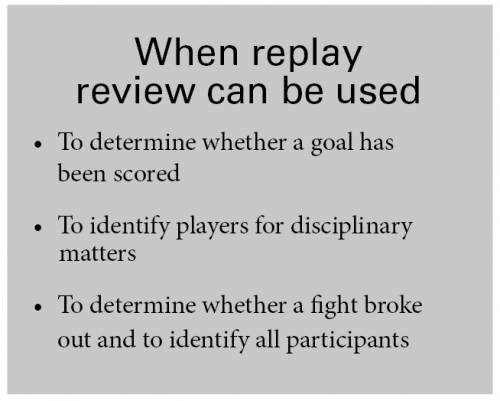
The National Collegiate Athletic Association (NCAA) announced April 12 that the NCAA Playing Rules and Oversight Panel approved the use of video review in college soccer for the 2016 season. Both men and women’s soccer will have access to video replay for goal disputes, identifying players for disciplinary matters and identifying participants involved in a fight if one was to break out.
“I think technology is having a say in sports more and more. I think now we just need to get the idea of the correct policy in place to be able to manage all of these things,” DePaul men’s soccer coach Craig Blazer said. “That takes time and quality people managing these things so you can get consistency throughout the process. At the end of the day, it’s meant to make our game better, we just all need to make sure we’re in a timely manner managing all of the challenges along the way.”
Both head coaches need to agree to the use of video replay before the game kicks off in order for it to go into effect. DePaul women’s soccer coach Erin Chastain said it’s a step in the right direction for college soccer, but is skeptical at first due to the varying levels of technology from school to school.
“In the Premier League where they use it, or in hockey or other sports … they have the technology to do it and it’s obviously a high level of technology,” Chastain said. “I think it will be interesting to see because at different facilities there are different video capabilities, so certainly at some it’s probably going to be great and then at others, is it going to be clear evidence? I just don’t know.”
 For this reason, Chastain said her decision to agree with the use of video replay in a game will be circumstantial depending on the institution’s equipment for each specific match. She admitted she doesn’t think the Big East will adopt it because there’s “not consistent technology across the league.”
For this reason, Chastain said her decision to agree with the use of video replay in a game will be circumstantial depending on the institution’s equipment for each specific match. She admitted she doesn’t think the Big East will adopt it because there’s “not consistent technology across the league.”
Chastain said the use of it to identify players for disciplinary matters is going to be beneficial, but it’s the use of it in goal-scoring opportunities where she’s hesitant.
“You’re going to a camera and it’s subjective, just like it is during the game,” Chastain said. “Certainly you’d want it to be cut and dry, if you go to a camera, you can tell it’s over the goal line.”
Junior men’s soccer midfielder Kevin Beyer looks forward to the prospect of using replay to make sure calls are correct, especially when it comes down to scoring a goal.
“On the field you always want to get the call right; we would never want a situation where we believed we scored and it is disallowed wrongly,” Beyer said. “Something like this is a good thing going forward.”
“It can be a good thing, but I think it’s going to take time to correctly implement the whole procedure,” Blazer said.
Chastain said the most important thing for the NCAA to focus on now is making sure the technology is consistent throughout college soccer initially before it can be a success. Regardless of how long it takes to perfect in the college game, she knows it’s going to change the game to some extent.
“I think it’s certainly something we haven’t been used to. In basketball they have instant replay and other things that slow the game down … and soccer is just not like that,” Chastain said. “I just think it’s going to be interesting. It’s great that they want to be in line with what they do at the highest level, but they’re going to have to give all of the institutions (standards to adhere to) so that it’s consistent across the board.”

